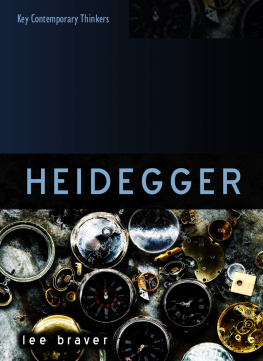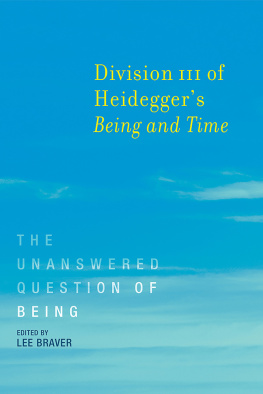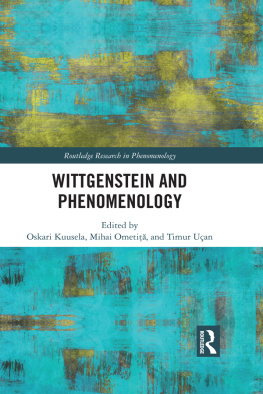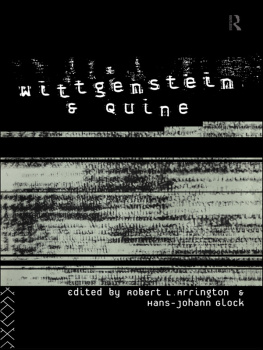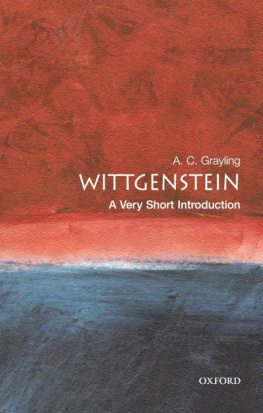
Table of Contents
Key Contemporary Thinkers Series includes:
Jeremy Ahearne, Michel de Certeau
John Burgess, Kripke
Michael Caesar, Umberto Eco
M. J. Cain, Fodor
Gareth Dale, Karl Polanyi
Oliver Davis, Jacques Rancire
Reidar Andreas Due, Deleuze
Chris Fleming, Rene Girard
Edward Fullbrook and Kate Fullbrook, Simone de Beauvoir
Graeme Gilloch, Walter Benjamin
Christina Howells, Derrida
Simon Jarvis, Adorno
Rachel Jones, Irigaray
Sarah Kay, iek
S. K. Keltner, Kristeva
Moya Lloyd, Judith Butler
James McGilvray, Chomsky, 2nd edn
Lois McNay, Foucault
Dermot Moran, Edmund Husserl
Marie-Eve Morin, Jean-Luc Nancy
Timothy Murphy, Antonio Negri
Harold W. Noonan, Frege
Severin Schroeder, Wittgenstein
Susan Sellers, Hlne Cixous
Dennis Smith, Zygmunt Bauman
James Smith, Terry Eagleton
Geoffrey Stokes, Popper
James Williams, Lyotard
Copyright Lee Braver 2014
The right of Lee Braver to be identified as Author of this Work has been asserted in accordance with the UK Copyright, Designs and Patents Act 1988.
First published in 2014 by Polity Press
Polity Press
65 Bridge Street
Cambridge CB2 1UR, UK
Polity Press
350 Main Street
Malden, MA 02148, USA
All rights reserved. Except for the quotation of short passages for the purpose of criticism and review, no part of this publication may be reproduced, stored in a retrieval system, or transmitted, in any form or by any means, electronic, mechanical, photocopying, recording or otherwise, without the prior permission of the publisher.
ISBN-13: 978-0-7456-6491-0 (hardback)
ISBN-13: 978-0-7456-6492-7 (paperback)
ISBN-13: 978-0-7456-8117-7 (epub)
ISBN-13: 978-0-7456-8116-0 (mobi)
A catalogue record for this book is available from the British Library.
The publisher has used its best endeavours to ensure that the URLs for external websites referred to in this book are correct and active at the time of going to press. However, the publisher has no responsibility for the websites and can make no guarantee that a site will remain live or that the content is or will remain appropriate.
Every effort has been made to trace all copyright holders, but if any have been inadvertently overlooked the publisher will be pleased to include any necessary credits in any subsequent reprint or edition.
For further information on Polity, visit our website: www.politybooks.com
What the hell this one's for me. I wrote the damn thing after all.
Acknowledgments
I want to thank my children, Sophia, Julia, and Ben, and my wife, Yvonne, for their patience and support.
Abbreviations
| BQ | Basic Questions of Philosophy: Selected Problems of Logic |
| BT | Being and Time |
| BW | Basic Writings |
| CP | Contributions to Philosophy |
| DT | Discourse on Thinking |
| EF | The Essence of Human Freedom: An Introduction to Philosophy |
| EGT | Early Greek Thinking: The Dawn of Western Philosophy |
| EHP | Elucidations of Hlderlin's Poetry |
| ET | The Essence of Truth |
| FS | Four Seminars |
| HCT | History of the Concept of Time |
| HH | Hlderlin's Hymn The Ister |
| HR | The Heidegger Reader, ed. Figal |
| ID | Identity and Difference |
| IM | An Introduction to Metaphysics |
| KPM | Kant and the Problem of Metaphysics, 5th edn, enlarged |
| M | Mindfulness |
| MFL | The Metaphysical Foundations of Logic |
| N | Nietzsche, vol. denoted by Roman numeral |
| OBT | Off the Beaten Track |
| OWL | On the Way to Language |
| PLT | Poetry, Language, Thought |
| PM | Pathmarks |
| PR | The Principle of Reason |
| PT | The Piety of Thinking |
| PWD | Philosophical Writings of Descartes, 3 vols. |
| QT | The Question Concerning Technology and Other Essays |
| STF | Schelling's Treatise on the Essence of Human Freedom |
| TB | On Time and Being |
| WCT | What Is Called Thinking? |
| WIP | What Is Philosophy? |
| WT | What Is a Thing? |
| Z | Zollikon Seminars: ProtocolsConversationsLetters |
Note: Smaller, numbered divisions within some texts are referred to using the following symbol:
Introduction: An Initial Orientation
Martin Heidegger (18891976) is, by many estimations, the most important philosopher of the twentieth century, at least in what is known as the continental tradition. His work forms the connecting point of most of the major schools of the time. His early work brings together the dominant influences of the late nineteenth and early twentieth centuries neo-Kantianism, existentialism, hermeneutics, and phenomenology whereas his later thought is the dominant influence on much of what followed post-modernism, post-structuralism, and deconstruction, as well as later forms of hermeneutics and phenomenology. Little in twentieth-century continental philosophy can be fully understood without a solid grasp of Heidegger's ideas.
This is what I try to provide the reader with in this book. There are certainly limits to how much I can cover of Heidegger's work, both in depth and breadth; his collected works amount to more than one hundred volumes, after all. But I will try to discuss many of his main ideas, the central themes he returns to again and again. No single book could hope to convey the nuances and complexities of his thought. This book is certainly not meant to be a substitute for reading Heidegger but an aid to doing so, a companion to give you an initial orientation to your own reading of his difficult works.
For they are disorienting indeed. Heidegger spends a great deal of time studying the history of philosophy, and I think it's fair to characterize this as a lovehate relationship. On the one hand, he is a relentless critic of the tradition, tirelessly berating past philosophers (with the exception of the pre-Socratics) for neglecting the question of being, his one unwavering focus. Philosophers have generally taken a particular understanding of what it means to be usually something like a substance which is self-sufficient and self-enclosed and applied it to everything that is. Heidegger's task, as he announces in his first book, Being and Time, is to reawaken this question that has been forgotten and ignored.
Yet, on the other hand, he constantly expresses enormous admiration for the great philosophers, seeing some of the best clues as to how to answer and even how to ask this question in the history of philosophy. These are the people who came closest to asking it, and even their negligence is informative. What they overlooked is not random but forms specifically shaped gaps in their thought and if we pay attention to both what they say and what they don't say, we can look through these holes to see the outlines of what they passed over and around.
Next page
